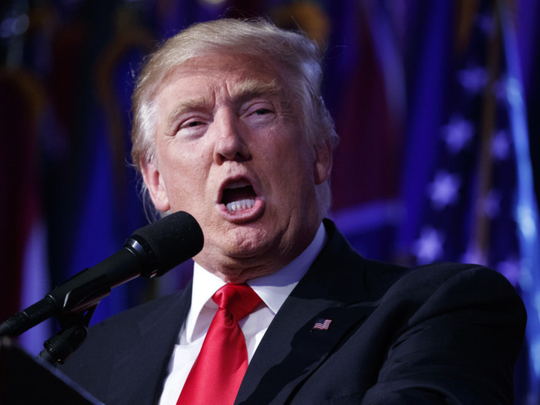
Has the era of the Palestinian state really ended? This is the most-asked among Israelis since Donald Trump won the US presidential election. The media has become engrossed with what will happen next in US-Israeli relations during Trump’s era, with Israeli politicians and analysts frequently talking about how the new US administration will get involved in the Middle East and the Palestinian-Israeli conflict.
Questions abound on whether Trump will be neutral on the issue as announced earlier? Or, will he move the American embassy to occupied Jerusalem? Will he give the green light for more construction of Jewish colonies and will he declare an end to the two-state solution? Will Trump opt for the “best deal” he talked about last week between the Israeli government, the Palestinian National Authority and Arab States? Finally, are his all election campaign promises not “worth [a] crust of garlic”, according to Israeli writer Itamar Eichner in the Yedioth Ahronot?
Knowing that Trump is prone to changing his mind, he can change his policy overnight as well, so no judgement can be predicted based on his announcements during the campaign. Trump started his election campaign with a declaration that “one of the goals I look to achieve if I am elected is to bring about peace between Israel and its neighbours, I don’t think this can be made by saying someone is good and the other is bad”. He even added recently, in an interview with the New York Times on November 23, 2016, that “I wish to work to clinch a peace deal between Israel and the Palestinians, which will be a great achievement”.
Million-dollar question
In this regard, while analyst views vary in Israel, the West and even in the Arab world, many of them indicate that Trump has qualities that may lead him to be a president different from his predecessors. The million-dollar question is: Will Trump seek to end the current stalemate because he is able to and wishes to do so? Three basic reasons emerge in answering with ‘yes’ to the ‘ability’ notion should he have the desire to do so:
* First, Trump has shown that he deals with issues differently from other politicians whom are usually accused of playing with words. After his victory, he has openly announced that “he will seek during his term in office to broker a peace deal that brings an end to what he called ‘the endless war’.” In business language, he said that as a dealmaker, he wants to “do the deal that can’t be made for the sake of humanity”. Israeli journalist Yossi Melman says “Trump is full of surprises, a quality that could make him turn his back on Israel”. With a business mind, Melman added, “Trump believes [in] no free meals and he can be astonished that Israel has the preferential status in the American external aid programme, receiving a sum of $3.8 billion (Dh13.9 billion) annually, and will ask as to whether such a large investment is fruitful for American interests”.
Israeli analyst Dimitry Chomsky sees the situation from a different perspective, linking it to international relations, and saying that “Russia’s position on Palestine is more balanced than that of the US and the new president will not ignore his new ally [Russia] and so Trump who spoke about the Israeli-Palestinian conflict in terms of trade and deals, has to consider the position of who will be his closest partner in international deals” — namely Vladimir Putin.
* Secondly, Trump is an ambitious man who spoke of his dream to reach the White House as early as 1987. Then, he said he would win the presidential election as soon as he ran for it, because he felt that he had “a chance to win so that he can change the United States to a better situation”. Some analysts believe that with his ambition and the logic behind a businessman who aspires for achievement, he is capable of bring such a vision about. Such an assumption arouses concern among some Israeli and Zionist parties who rightly ask: Would Trump, the ambitious businessman, seek a political settlement between Arabs and Israelis in order to have a place in history and maybe win a Nobel award?
* Finally, Trump owes no one his victory. Most Republicans opposed his election bid and he used his own funds in his campaign. He is, thus, free and has a chance more open to him more than any other president, should he decide to put his weight behind a solution to the conflict. One can see now how the Republican Party leaders who stood against him are seeking to get closer to him and consequently they will support his efforts as regards the Middle East conflict, especially given that Trump will always support Israel’s strategic interests. The Democrats in the Congress will welcome any political settlement for the conflict Trump might broker. The same applies to the majority of states in the world.
It seems that Trump can succeed where others failed. We stand before a business mentality that may adopt a policy of normalisation of international relations based on the principles of partnership and investment. According to Israeli writer Abraham Ben-Tzvi, “Trump will have a businesslike perspective on [the] international arena, and it can be said that he will deal with allies or adversaries separately depending on each situation”.
— Professor As’ad Abdul Rahman is the chairman of the Palestinian Encyclopaedia












